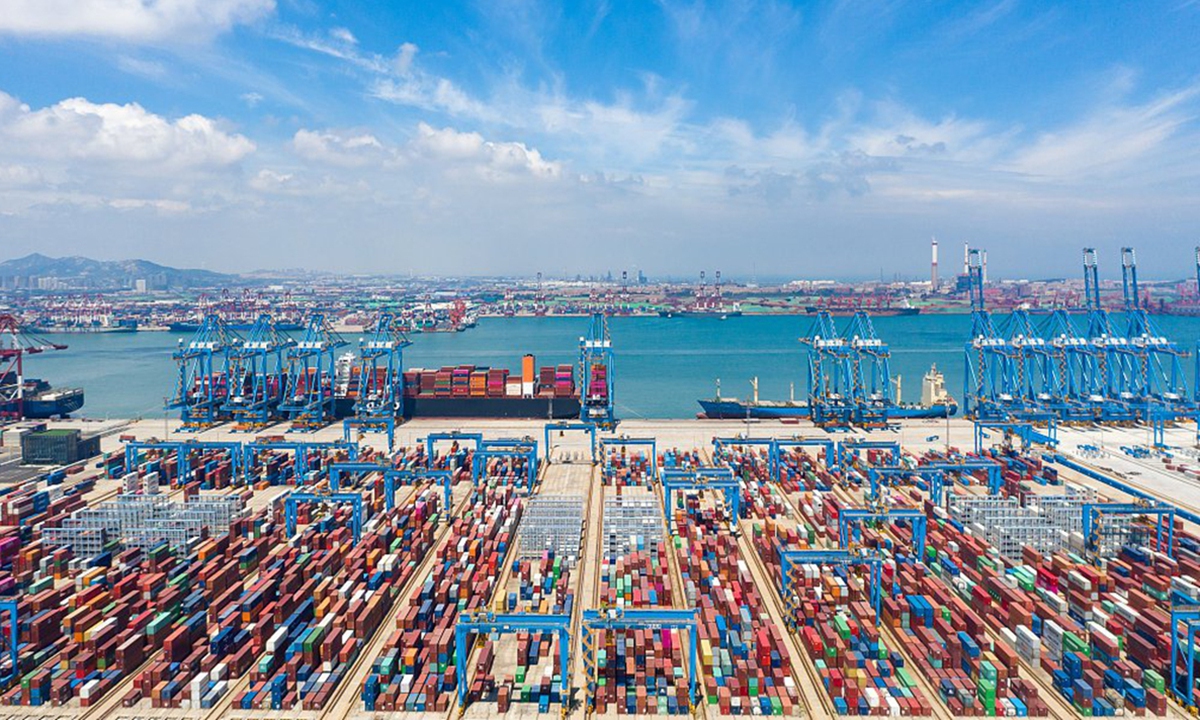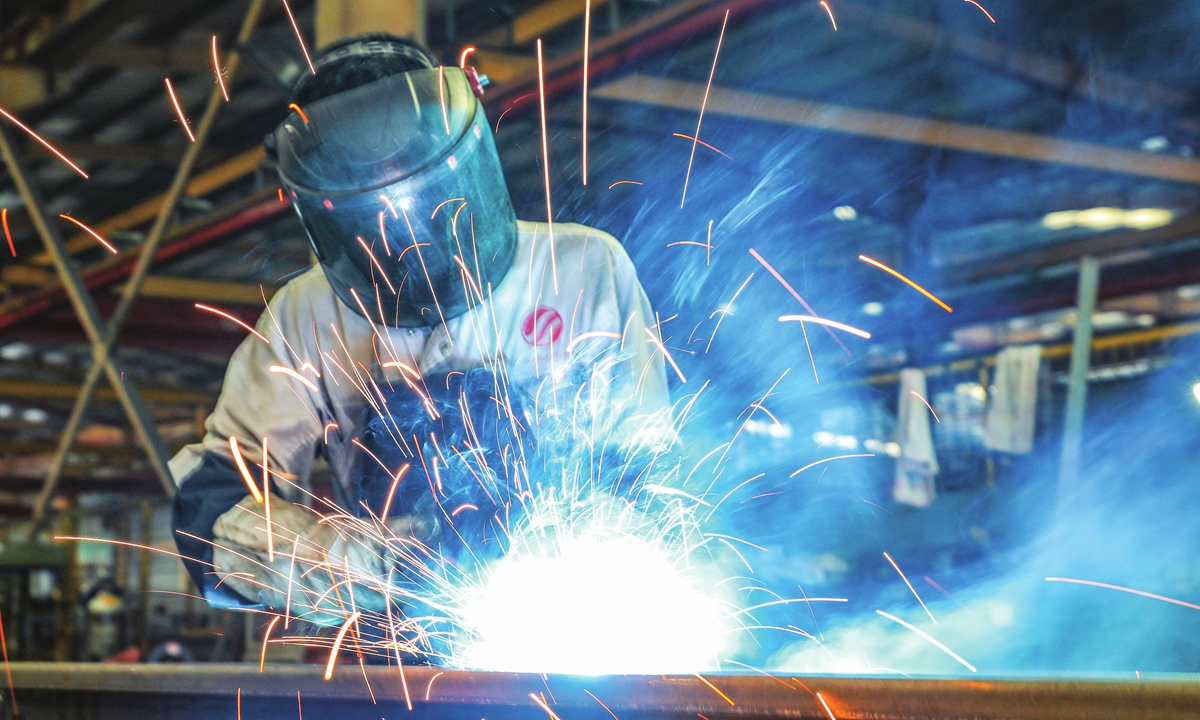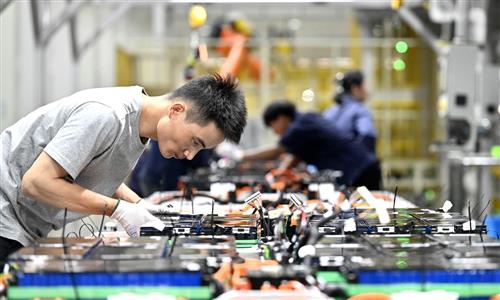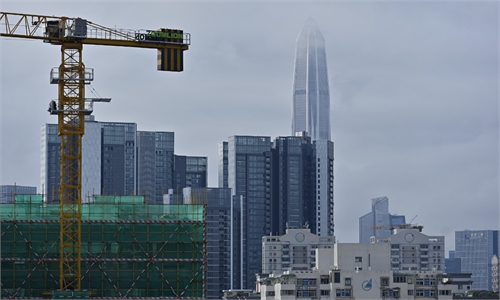
China trade economy File photo: VCG
Following the newly-announced executive order that restricts US investment in some high-tech industries in China, US President Joe Biden on Thursday intensified the smear campaign against China by claiming that the country is a "ticking time bomb" due to its economic challenges and it was in trouble because of weak growth. Chinese experts said on Friday that Biden purposely made these demeaning and smearing comments to distract the domestic audience's attention from domestic issues and gain political benefits for his campaign in the 2024 US presidential election.
Despite recent exchanges between senior Chinese and US officials, there has been no real easing of bilateral relations, experts said. They said since the US side is unlikely to change its foreign policy on issues such as the Taiwan question, the South China Sea and economy and trade, and especially the high-tech sector, it will be more aggressive toward China on these issues.
"China is in trouble," Biden said at a political fundraiser in Utah on Thursday, Reuters reported. "They have got some problems. That's not good because when bad folks have problems, they do bad things," Biden said, claiming that he did not want to hurt China and wanted a rational relationship.
It is understandable that Biden claims that the Chinese economy has troubles and that China's rapid rise is unsustainable, since the US considers China a strategic rival and wants to beat China. By demeaning China, Biden wants to showcase his capability in driving up the US economy to inject confidence into his domestic audience as he seeks a second-term, Xin Qiang, deputy director of the Center for American Studies at Fudan University, told the Global Times on Friday.
Xin said almost all US presidential candidates running for the 2024 campaign hype China topics in order to distract voters from ingrained US domestic problems such as abortion, guns and drugs.
"It's a diplomat mistake for Biden to make such comments about China, which is caused by poor politics in the US such as gerontocracy. This will damage the image of the US itself," Xin said, noting that China's economic growth and social stability will be a slap in the face of the US.
Sun Chenghao, a fellow and head of the US-EU program at the Center for International Security and Strategy at Tsinghua University, warned that such a smear campaign against China will have a negative impact on the global economy.

Young people wait in front of snack stalls in a night market in Zhengzhou city, Central China's Henan Province, on April 2, 2023. Photo: VCG
No deflation in China
While some Western media and politicians hype China's so-called "economic woes," the fact is that China's economic recovery speed took the lead among major economies, and its strong rebound in the first half of 2023 has contributed to economic recovery in other countries and the whole world in a direct and notable way, Zhou Mi, a senior research fellow with the Chinese Academy of International Trade and Economic Cooperation, told the Global Times.
"In the process of economic recovery, fluctuations are normal and temporary in some fields," he said, noting that weak external demand from major economies including the US and the EU led to a drop in China's foreign trade in July.
Despite mounting external challenges, the Chinese government has taken the initiative to fully tap the country's economic potential with the rollout of a series of policies to stimulate consumption and boost the private economy. Thanks to the implementation of various policies, market expectations have shown signs of improvement, with China's manufacturing PMI at 49.3 in July, up for a second straight month, official data showed.
Due to a high base in the corresponding period of 2022, China's CPI declined 0.3 percent year-on-year in July but was up by 0.2 percent compared with June, data from the National Bureau of Statistics showed on Wednesday.
The Financial Times, The New York Times and a couple of other Western media started a new round of misinformation that China has fallen into deflation and the economy "will become trapped in a downward spiral."
"Although the price of some goods dropped in China, the country's money supply remains sufficient and the economy is at the recovery stage. China has no deflation risks," Ming Ming, chief economist at CITIC Securities, told the Global Times on Friday.
Falls in consumer prices cannot be simply equivalent to deflation. According to the standard definition, deflation involves constant decline in prices for goods and services and constant decrease in the supply of money, typically associated with economic recession, Ming said.
He said the country's weak inflation is mainly due to a periodic price drop and a divergence between supply and demand in the process of economic recovery, which can be eased through appropriately relaxed monetary and fiscal policies.
"Although certain US macro-economic data looks good, it's unsustainable because it's made by damaging international economic and trade rules and squeezing other countries' development potential," Zhou said, noting that the US' irresponsible financial policies and protectionist practices negatively impacts market confidence globally.
While US politicians and media bad-mouth the Chinese economy, the US' finance and ever-growing federal debt burden has aroused market concerns over its worsening debt woes. Fitch, one of the three major independent agencies that assess governments' creditworthiness, cut the US debt rating from the highest AAA to AA+, citing the country's "steady deterioration in standards of governance."
The rating agency said that the US banking sector is facing "several sources of strain," such as funding pressures, regulatory capital weaknesses and rising risks associated with commercial real estate exposure.
On Monday, Moody's Investors Service downgraded several US banks and flagged several others for potential downgrades, signaling that the US banking crisis is far from over, even after the collapse of five banks so far this year.
US Chapter 11 bankruptcy filings reached 2,973 in the first six months of 2023, jumping 68 percent on a yearly basis, according to data released by Epiq Bankruptcy, a provider of US bankruptcy filing data.
Currently, both China and the US have many challenges, and they should strengthen cooperation, especially in macro-economic policy coordination and global economic governance, Sun told the Global Times on Friday. He said if the US escalates "decoupling" from China, it will create more troubles for the two countries.

A worker makes elevator parts that will be sent overseas in a factory in Nanxun district of Huzhou, East China's Zhejiang Province on July 18, 2023. Photo: VCG
Promising prospect ahead
"Chinese economy is well on the recovery track," Zhang Yansheng, chief researcher of the China Center for International Economic Exchanges, told the Global Times on Friday.
A slew of new policy measures to support economic growth have effectively stabilized confidence and expectations, and the crux is how to earnestly implement those policies, Zhang said, noting that he expected there would be a notable improvement in the Chinese economy in the second half of the year.
Yang Delong, chief economist at Shenzhen-based First Seafront Fund Management Co, called for patience about China's economic recovery since it takes time to overcome the lasting impact of the pandemic and the restructuring of global industrial and supply chains.
He told the Global Times that there is room for reserve requirement ratio and interest rate cuts in the second half of 2023, and authorities may roll out more infrastructure investment projects.
Meanwhile, China is ramping up efforts to financially support debt-ridden real estate developers to ensure the timely delivery of new homes to buyers, with more than 1.65 million presale homes being delivered since the government initiative of "ensuring timely delivery of presale housing" was launched and implemented in July 2022, official data showed.
According to media reports, the China Securities Regulatory Commission held a meeting with several top developers and financial institutions to understand the home sales and debt problems of developers while seeking advice for funding.
Amid China's economic recovery and growing troubles for the US economy, global investors have already poured investment into China's financial markets in recent months. A total of $3 billion was added to China's debt market in July, a net inflow of funds from foreign investors for the first time this year, as optimism grew on the wider emerging market assets, the South China Morning Post reported on Thursday, citing the Institute of International Finance.
In the first half of 2023, Standard Chartered saw pre-tax profits from its onshore and offshore China business quadruple to $700 million and the Chinese market remains the largest contributor to Standard Chartered's overall revenue, according to a statement the bank sent to the Global Times.
"China is the power source of world economic stability and growth, and Standard Chartered is firmly optimistic about China's long-term development," Zhang Xiaolei, head of Standard Chartered China, was quoted as saying in the Chinese statement.
UBS also said in a recent report that the investment bank remains bullish on Chinese stocks thanks to measures to boost consumption.


